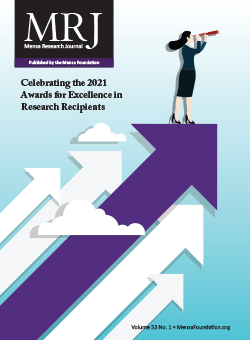Celebrating the 2021 Awards for Excellence in Research Recipients
- Mar 1, 2022
- Jeff Papa, Ph.D., Mensa Research Journal Editor-in-Chief

IN CONJUNCTION WITH the celebration of its 50th anniversary, the Mensa Foundation recently announced its 2021 research award winners. This issue of the Mensa Research Journal is dedicated to honoring those award winners and sharing some of the fascinating work representing their achievements.
The most prestigious of these honors is the Mensa Foundation Prize, which was awarded to Dr. Danielle Posthuma, a University Research Chair Professor at Vrije Universiteit Amsterdam, where she also heads the Department of Complex Trait Genetics. This issue of the MRJ features an in-depth interview of Dr. Posthuma by Mensa Bulletin Editor Chip Taulbee, in which Dr. Posthuma describes her groundbreaking research identifying nearly 1,000 genes associated with intelligence.
The Mensa Foundation also presented its Awards for Excellence in Research, given internationally for outstanding research on intelligence, intellectual giftedness, and related fields. The award-winning research of these individuals, reprinted in this issue of the MRJ, includes: Dr. Jennifer Riedel Cross (“Psychological Heterogeneity Among Honors College Students”); Dr. Tracy L. Cross (“A Comparison of Perceptions of Barriers to Academic Success Among High-Ability Students from High- and Low-Income Groups: Exposing Poverty of a Different Kind”); Dr. Kate Snyder (“Interventions for Academically Underachieving Students: A Systematic Review and Meta-analysis”); Dr. Lisa Bardach (“Smart Teachers, Successful Students? A Systematic Review of the Literature on Teachers’ Cognitive Abilities and Teacher Effectiveness”); Brian Bernstein (“Psychological Constellations Assessed at Age 13 Predict Distinct Forms of Eminence 35 Years Later”); and Dr. Darya L. Zabelina (“Unity and Diversity of Executive Functions in Creativity”).
Dr. David Lubinksi was also recognized with the Award for Excellence in Research for his article, “Intellectual Precocity: What Have We Learned Since Terman?” We featured this article in the MRJ last year (volume 52, no. 2), so while we have not reprinted it here, we have included an abstract of the article as well as a brief biography of Dr. Lubinski in recognition of his achievement.
The Mensa Foundation also presented the following honors in 2021: Lifetime Achievement Award to Dr. Joseph S. Renzulli; the Laura Joyner Award (for outstanding work, theoretical or applied, in education, literacy, or work with the gifted or identifying threats to or preventing the loss of intelligence) to the organization Literacy Now; the Distinguished Teacher Award to Kristina Tons; the Gifted Education Fellowship (Doctoral — separate awards) to Michelle Falanga; and Fabio Andres Parra-Martinez; and the Gifted Education Fellowship (Non-doctoral) to Katie Lee. For more information about these honorees and their work, please see the immediately previous issue of the MRJ (volume 52, no. 3).
In keeping with our focus on the 2021 Mensa Foundation honorees, the Random Samples and Standard Deviations column, which debuted in that Fall MRJ, continues in this issue, focusing on the theme of “winning.” You will also find the latest information on the Colloquium sponsored by the Mensa Foundation in this issue.
In our non-award recognition issues, each edition of the MRJ spotlights a particular theme or core focal point on any subject area pertaining to the topic of intelligence; if you have suggestions for future issue topics, particular research or researchers of interest, or just general thoughts on the MRJ, please let us know. You can contact me directly at MRJeditor@mensafoundation.org.
I hope you enjoy this issue’s compilation of truly outstanding achievements.
* * *
Published three times yearly, the Mensa Research Journal highlights scholarly articles and recent research related to intelligence from a diverse selection of nationally and internationally esteemed authors. Learn more about the MRJ and subscribe today.
Featured Research
- “Psychological Heterogeneity Among Honors College Students,” by Tracy L. Cross, Jennifer Riedl Cross, Sakhavat Mammadov, Thomas J. Ward, Kristie Speirs Neumeister, and Lori Andersen (Journal for the Education of the Gifted, Vol. 41, Issue 3)
- “A Comparison of Perceptions of Barriers to Academic Success Among High-Ability Students From High- and Low-Income Groups: Exposing Poverty of a Different Kind,” by Jennifer Riedl Cross, Andrea Dawn Frazier, Mihyeon Kim, and Tracy L. Cross (Gifted Child Quarterly, Vol. 62, Issue 1)
- “Intellectual Precocity: What Have We Learned Since Terman?,” by David Lubinski and Camilla P. Benbow (Gifted Child Quarterly, Vol. 65, Issue 1)
- “Interventions for Academically Underachieving Students: A Systematic Review and Meta-analysis,” by Kate E. Snyder, Carlton J. Fong, Jackson Kai Painter, Caroline M. Pittard, Sebastian M. Barr, and Erika A. Patall (Educational Research Review, Vol. 28)
- “Smart Teachers, Successful Students? A Systematic Review of the Literature on Teachers’ Cognitive Abilities and Teacher Effectiveness,” by Lisa Bardach and Robert M. Klassen (Educational Research Review, Vol. 30)
- “Psychological Constellations Assessed at Age 13 Predict Distinct Forms of Eminence 35 Years Later,” by Brian O. Bernstein, David Lubinski, and Camilla P. Benbow (Psychological Science, Vol. 30, Issue 3)
- “Unity and Diversity of Executive Functions in Creativity,” by Darya L. Zabelina, Naomi P. Friedman, and Jessica Andrews-Hanna (Consciousness and Cognition, Vol. 68)
- “A Discussion With 2021 Mensa Foundation Prize Winner,” by Chip Taulbee
- “Looking Beyond the Bell Curve,” by John Thompson